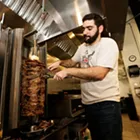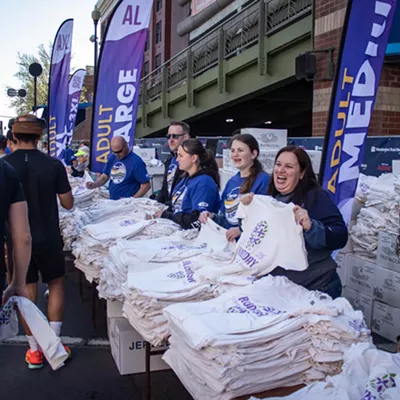OK, it's true that no one person can slow global warming — even by becoming a zero-waste, thrift-shopping vegan who doesn't own a car and has a composting toilet and a rain barrel. But there are plenty of little things you can ditch, use and buy that all add up, all of which are better alternatives for both our local communities and the planet. Here's a small sampling of some measures you can (and should) take.
SKIP IT
Plastic straws: Straws are the new plastic grocery bag, sort of. Though they're a relatively small item in the overall waste stream, straws have lately caught the brunt of environmental hatred and fury for their prolific usage. One argument is that they're generally unnecessary for consuming liquid or semi-liquid beverages. Straws, due to their size and weight, are also much less likely to be recycled, according to a report by National Geographic. But the worst thing about straws comes back to size: When plastic straws end up in the ocean, they can entangle and get stuck in/on marine animals, or be eaten. And if you really can't handle a strawless lifestyle, there are lots of reusable metal and plastic options to be found.
Take-out utensils, napkins and packaging: Packaging is the largest chunk of all municipal waste in the U.S., and single-use items make up 10 percent of that, according to the University of California's Climate Lab. When you order food to-go, if you can, tell employees you don't need or want utensils, napkins, sauce packets or other extras that otherwise go straight into the trash. Instead, keep some metal silverware at your desk and use your own utensils (which you probably do anyway) or staple condiments like ketchup and hot sauce at home.
Free two-day shipping: We've all become slaves to the convenience of online shopping, but what is the cost to the planet? Though shopping online does have a lesser carbon footprint than driving your car to the store, it's only better than this if you don't get two-day or rush shipping, says UC's Climate Lab. Faster shipping turnaround equates in more trucks on the road because companies are trying to get things to customers as fast as possible, and also means trucks are sometimes half full. Multiple-item orders are often shipped in separate boxes (creating more packaging waste!) to get things to your door quickly. So next time you click "buy," if you don't need it ASAP, consider opting in to "no-rush shipping" or clicking a box to tell the seller to group your items into fewer packages.
Meat: Whether you buy into the ethical tenets of vegetarian and veganism, eating less meat is a proven way to be a better environmental steward — especially red meat, which can have up to 100 times the impact as plant-based food due to production requirements. You don't have to go full vegan (scientifically, however, it is the best diet for the planet), but you can make a small sacrifice by going meatless once a week. Meatless Monday is a global movement encouraging people to skip meat once a week in order to reduce global meat consumption by 15 percent. Learn all about the initiative at meatlessmonday.com.
WEAR IT
Sustainable fashion: The trend is so hot right now. There's always been thrifting, and capsule wardrobes — a pared-down collection of quality, timeless, staple pieces — are making new waves. Another recent innovation in the fickle fashion industry benefits both shoppers and the environment. Lots of brands are now using post-consumer plastics to make shoes, yoga pants, T-shirts, bags and other items.
Based in San Francisco, (1) Rothy's (rothys.com) is a sustainable fashion startup using a 3D knitting technology — with fiber made from recycled plastic water bottles — to make its women's shoes. Though the shoes are a slight up-front investment ($125-$165), they're machine washable, breathable, stylish, comfortable and recyclable at the end of their lifespan if you contact the company to send back worn and loved pairs.
Another fashion innovator is using a similar process to make women's yoga pants from discarded water bottles. (2) Girlfriend Collective (girlfriend.com), based in Seattle, sells a variety of legging ($58-$60) styles and colors, along with yoga shorts, sports bras, tanks and tees. We also give Girlfriend Collective points for their body-positive models and for using 100 percent recyclable packaging.
Billboards become trendy bags in the hands of Shark Tank alum (3) Rareform (rareform.com). The California-based company takes massive sheets of vinyl formerly used for billboard displays and repurposes the sturdy, waterproof material into one-of-a-kind backpacks ($72-$118), duffels ($64), laptop sleeves ($38), totes ($44) and more. Because cuts made to manufacture each piece are unique, no two items are the same.
USE IT
(4) Programmable thermostat: The New York Times' "Year of Living Better" guide lists lots of things that can be done to reduce your home's carbon footprint: turning off lights and appliances, using LED bulbs, turning down your water heater to 120 degrees, insulating your home and more. Another option is installing a programmable thermostat, which is not only better for the Earth, but will save you money and can improve comfort. In winter, keep temperatures lower during the day when you're at work or school and at night when cozy in bed. In the Inland Northwest, Avista even offers rebates for customers who can document they've installed a smart thermostat, many of which can be connected to Wi-Fi and are accessible via smartphone apps.
(5) Reusable food storage: While the waste of food itself is one of the biggest contributors to global warming (collectively, Americans waste 40 percent of the food they buy, resulting in 3.3 billion tons of carbon emissions), there are also better ways to package and store goods in your pantry and fridge with reusable products. Buy dried grains, beans and spices in bulk using your own containers. (Glass canning jars work great!) Also ditch plastic cling wrap and sandwich bags for cotton waxed with beeswax, which can be washed, reused and composted at the end of its life. There are also all kinds of reusable, dishwasher-safe snack and sandwich storage bags made from silicone and other food-safe materials. While all of these products cost more up front (depending on brand, material and quantity) than your standard plastic baggies, they're definitely friendlier to the planet.
(6) Reusable water bottles and coffee cups: One million disposable bottles of water are purchased around the world each minute, according to UC's Climate Lab. This staggering rate, predicted to only increase, means that by the year 2050, there could be more plastic (by weight) in the ocean than fish. Let that sink in for a minute, and then run out and get yourself a reusable water bottle. Whether you want something insulated, with a reusable straw, made from stainless steel or glass, the options are endless. Some tried-and-true brands to consider investing in include S'well, CamelBak, Klean Kanteen, Contigo, Hydro Flask and Platypus. Don't overlook a reusable receptacle for your morning coffee, either. Unlike plastic, many to-go coffee cups made from styrofoam or paper are not recyclable. Instead, get yourself a KeepCup, ($9-$28).
(7) Menstrual cups and reusable feminine hygiene products: Over her lifetime, it's estimated a woman will use anywhere between 5,000 and 14,000 tampons. Notwithstanding the cost, that's a lot of non-biodegradable waste that is ending up in landfills or clogging up wastewater treatment plants, not to mention all the packaging in wrappers and applicators and the resources used to produce these single-use products. Yet it's a topic that's often not talked about (menstrual bleeding may be uncomfortable for some; but seriously, this is 2018 — get over it) in terms of environmental impact. Luckily, there's a product for that — several, actually. Menstrual cups may sound icky to the uninitiated, but they're actually more hygienic and safer than tampons. Made from soft silicone, the cups are often more comfortable, too. Try the DivaCup ($25-$30 on Amazon). If that's not your style, there are also Thinx brand "period panties" ($24-$39) and washable liners and pads sold by several companies. ♦




















